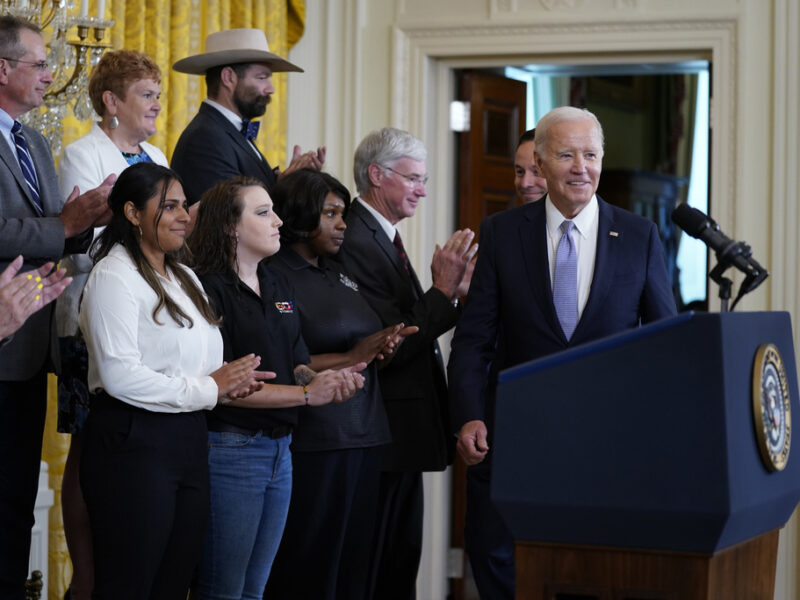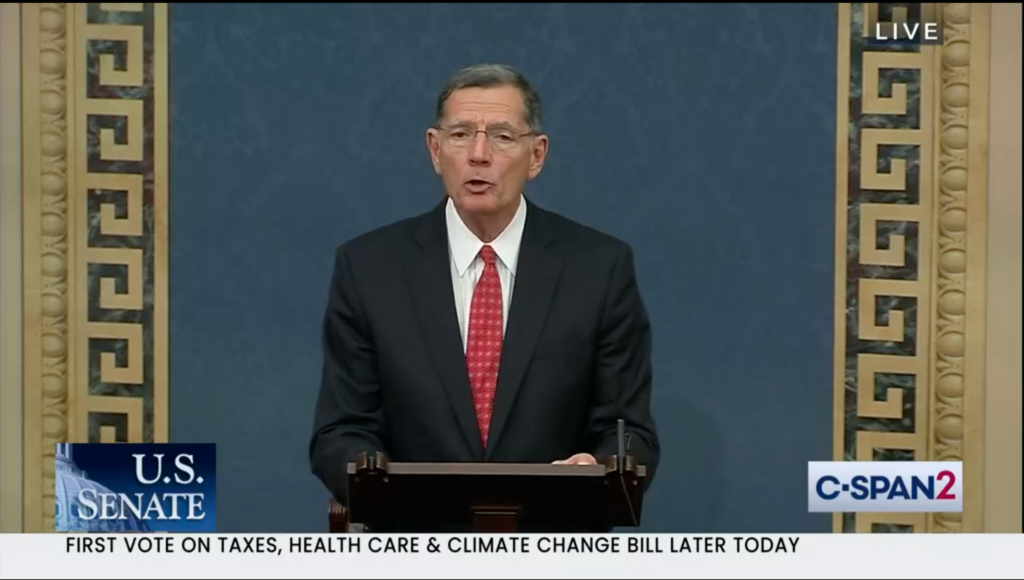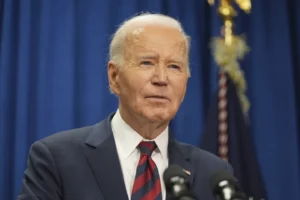Biden Touts Anniversary of Inflation Reduction Act as Wyoming Lawmakers Seek Its Repeal
State stands to bring in nearly $5B in investments from the legislation, but most state leaders oppose it
- Published In: Politics
- Last Updated: Aug 17, 2023

President Joe Biden on Wednesday celebrated the anniversary of the passage of his signature climate, tax and health care law, the Inflation Reduction Act. (AP Photo/Evan Vucci)
By Jacob Gardenswartz
Special to the Wyoming Truth
WASHINGTON — Administration officials, elected Democrats and other supporters crammed into a jam-packed White House East Room on Wednesday to celebrate the one-year anniversary of a “landmark” piece of legislation: the Inflation Reduction Act (IRA), President Joe Biden’s signature climate, tax and health care package.
The sweeping measure, which narrowly passed last year with exclusively Democratic support, appropriated nearly $370 billion towards climate mitigation and green energy development with an ambitious goal of cutting greenhouse gas emissions almost in half by 2030. It also capped the price of insulin at $35 a month and allowed the government to negotiate drug prices for Medicare recipients directly with pharmaceutical companies, a long-sought provision estimated to save seniors and the federal government hundreds of billions of dollars.
Yet in Wyoming, the law received near-universal opposition from elected officials, despite the fact the state stands to receive upwards of $5 billion in public and private investments resulting from it. Wyoming’s entire congressional delegation voted against it, while a bill seeking its repeal has earned support from GOP lawmakers, including Rep. Harriet Hageman (R-Wyo.).
At issue are less the individual policies themselves than the politics embedded within them. Its inclusion in Biden’s climate agenda situates it as oppositional to Wyoming’s cultural identity.
Biden has sought to highlight the benefits the law brings to rural America. Almost 90% of the clean energy technology development projects announced have been in poorer counties with low-wage workers, a Department of Treasury analysis released Wednesday showed.
“We’re incentivizing companies to build clean energy projects in the same communities that powered our nation with fossil fuels,” Biden said.

“We owe them,” he noted, pledging to “ensure the benefits of the clean energy economy [are] reaching communities left behind.”
All in on green or all-of-the-above?
Biden has labeled himself the most pro-climate president in American history and described climate change an “existential threat” to humanity. With the IRA a central pillar of his climate policy, Wyoming leaders were all but duty-bound to oppose it.
The measure places no direct prohibition on oil and gas development, but instead seeks to spur development in the renewable energy sector through tax credits and other incentives. It imposes added costs on new oil and gas leases, raising the minimum bid on new federal leases to $10 per acre up from $2 and hiking the minimum royalty rate on those leases by over 4%, provisions trade groups vehemently opposed.
Still, there are dozens of provisions within the law that provide direct benefits to the Equality State. To win the support of Sen. Joe Manchin (D-W.V.), who has thwarted much of Biden’s energy agenda, the law mandates that federal lands can’t be leased for solar or wind energy projects without also putting up land for oil and gas development.
And many of the law’s climate mitigation measures stand to help the state rake in billions in public and private investments, subsidizing new wind and solar farms, nuclear energy projects and carbon capture technologies to make burning fossil fuels cleaner.
According to White House figures, the state has already brought in close to $5 billion as a direct result of the law: $2 billion from the TerraPower nuclear project and $2.8 billion in infrastructure upgrades impacting everything from airports to internet access.
Some state leaders have conceded that there are benefits to the measure, even as they maintain opposition.
“[The IRA] could certainly make the state more attractive for investment in some of the technology that, frankly, the governor has been pushing and has been leading on for a number of years now,” Gov. Mark Gordon’s spokesman Michael Pearlman told reporters last year.
But as the state trends further to the right on social and cultural policies, no one wants to be seen as handing Biden any sort of victory.
Barrasso last week penned an op-ed arguing that instead of “picking winners and losers” when it comes to energy development, Biden should embrace Republicans’ “all-of-the-above” approach and encourage development in both green energy sources and traditional fossil fuels.
Others, meanwhile, take an even more hardline position. Reid Rasner, a Casper businessman challenging Barrasso for the GOP Senate nomination, has suggested cutting back on renewable energy subsidies. “I would prioritize oil, gas and coal over renewable energy right now,” he told the Wyoming Truth.
A major critique: too much spending
Among Republicans’ top criticisms of the law is its price tag.
Initial estimates like a projection from the nonpartisan Congressional Budget Office placed the cost of the measure’s clean energy tax credits and health care subsidies at just under $500 billion.
Factoring in the law’s revenue-raising features, like savings from Medicare drug negotiations and new taxes on corporations and stock buybacks, offset the cost to actually save about $200 billion. Biden pledged the tax increases wouldn’t impact anyone making under $400,000 a year, but Republicans were skeptical.
The IRA amounts to nothing more than “another reckless tax and spending bill,” Barrasso said in remarks on the Senate floor during debate on the measure last year.
“I could not support this legislation that raises taxes on Wyoming families and pushes Green New Deal priorities,” echoed Lummis in a statement around that time.
State leaders signaled out the tax provisions, too.
“The Democrats’ solution to 40-year high inflation is passing another reckless tax and spending spree to the tune of $740 billion, affecting Americans in every tax bracket,” read a letter signed by Gordon and 21 other GOP governors. “Our citizens cannot afford Joe Biden’s broken promises on taxes and Democrats’ inflationary spending that will only exacerbate the economic crisis they created.”
Ultimately, their fears may have been warranted. Recent estimates for the measure’s total cost have skyrocketed to upwards of $1 trillion, in part due to the massive popularity of the law’s clean energy tax credits. Meanwhile, Republicans continue to seek rollbacks of some of the revenue-raising measures in the bill, only further inflating the price tag.
What’s in a name?
GOP critics also take issue with the law’s name, suggesting more government spending only adds to inflation, not reduces it.
The White House has pushed back forcefully by highlighting the positive economic indicators blanketing the nation: record-low unemployment, rising wages and a significant decline in year-over-year inflation. When Biden signed the IRA, inflation was close to 9%— hence Democrats’ desire to promise their signature law would reduce it.
Today, however, it’s hovering just above 3% — a significant improvement, albeit one experts say has little to do with provisions in the IRA.
White House officials contend that even though the IRA might not impact inflation directly, its cost-saving measures are helping average Americans hang onto a bit more cash at the end of each month. But even Biden himself recently conceded the law might not be the most accurately named.
“The Inflation Reduction Act — I wish I hadn’t called it that,” Biden remarked at a fundraiser in Utah last week. “Because it has less to do with reducing inflation than it has to do with providing for alternatives that generate economic growth.”













